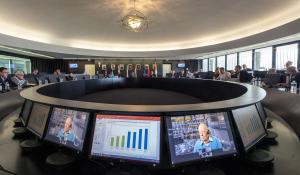Technical Coordination Meeting relaunched
Today, in the revamped Technical Coordination Meeting, the basic principle has been maintained. During four sessions spread over four days, participants were asked to contribute to discussions on a whole range of project areas. The overall objective for the meeting, as it will be for similar meetings moving forward, was to review overall technical progress and to receive updates on such important areas as safety, assembly, commissioning and other key engineering activities.
The meeting format—bringing together the integrated project team across departments and time zones—also fits squarely with the new ITER Director-General's promise to increase collaboration and transparency in the project. "Meeting like this around problems to solve is an excellent way to have new ideas emerge."
In the global landscape of ITER, the Technical Coordination Meeting will not be a decision-making body. Instead, recommendations and actions validated during the different sessions will be presented to the Executive Project Board for endorsement and approval.
"Certainly, during four days of discussion it is not possible to find solutions for all technical issues," concluded the Director-General. "And perhaps we were a little ambitious during this first meeting in trying to cover so many topics. But overall, the discussions were fruitful and a number of actions have emerged that we will pursue. What is of essential importance is to make sure that technical debates are exposed in plain sight—heated or not. This is what will ensure that ITER will eventually work as it should."
The Technical Coordination Meeting, open to all interested staff members from the ITER Organization and the Domestic Agencies, will take place every six months.


